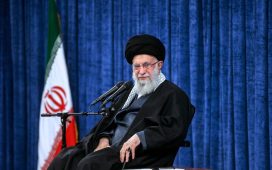RAMALLAH: The Palestinian Authority is facing protests from school teachers and lawyers over a number of grievances.
Palestinian sources told Arab News that a strike by doctors might follow, which will destabilize the status of the PA.
The teachers’ movement called on parents not to send their children to schools, and on students to only attend when their demands were met.
On Sunday morning, thousands of students returned to their homes because of the strike.
Omar Muheisen, a science teacher from Al-Shafei School in Hebron, told Arab News that the rate of commitment to the strike on Sunday in the city had reached 90 percent.
“We, as teachers, are living in a difficult predicament,” he told Arab News.
“It is not our problem if the prime minister, over the course of a whole year, did not succeed in solving the problem of teachers’ salaries,” he added.
Muheisen said the salary was not enough even to meet expenses until the middle of the month with outrageous rises in prices.
He said that the strike came after authorities failed to implement any previously agreed terms, including a 15 percent bonus starting from the first month of this year, and that the strike would continue until all their demands were met.
Teacher Jamal Al-Qaddoumi said that the agreement that was reached stipulated that the salary be regularized and a teachers’ union should be set up, but neither happened.
Al-Qaddoumi added the current salary was not sufficient to meet the needs of teachers, and it was not reasonable for teachers to work throughout the month on 85 percent of their salary. Half of Al-Qaddoumi’s income goes on bank loans, and the other half on bills and obligations, he said.
The Palestinian National Initiative Movement, headed by politician Mustafa Barghouthi, demanded fairness for teachers in a statement on Sunday, calling for their demands to be met and the education system to be saved in the interests of students.
It pointed out that the education and health sectors are among the most vital sectors, adding that male and female teachers had always performed their national and professional duties, and that their role was vital for building future Palestinian generations.
It stressed the importance of reviewing the public budget and allocating larger budgets for the education, health, and social welfare sectors, as they serve the broadest groups suffering most from poverty and marginalization.
Shaker Khalil, advisor to the prime minister on economic affairs, told Arab News that the financial crisis engulfing the PA is complex, due to the decline in external support and the high percentage of Israeli occupation deductions from Palestinian funds.
Khalil indicated that foreign aid for the past year was less than $200 million, and the total deductions of the Israeli occupation from the allocations of martyrs and prisoners amounted to $584 million since 2019.
This exacerbates the government’s financial crisis and is reflected in the general budget, he added.
In a parallel development, the Palestinian Bar Association suspended work on Sunday for four days, affecting all branches of the judiciary, in opposition to the amendment of the regular courts’ fees schedule.
Lawyer Alaa Khaseeb from Ramallah told Arab News that the PA’s doubling of court fees five times will make it difficult for citizens, considering the financial crisis they are living through, to go to court to sue, instead preferring to pursue matters themselves, which will negatively affect the work of lawyers, of whom there are nearly 12,000 in the West Bank.
Khaseeb indicated that the standard case fee, which was $700, is to become $3,500, making it impossible for many citizens to pay.
Lawyer and human rights activist Amer Hamdan from Nablus told Arab News that the basis of the PA’s problem with teachers and lawyers is poor political decision making.
He alleged that the PA had raised court fees to obtain money from citizens directly, a step that will force people to tribal courts or to seek fulfilment of their rights by force.
“The PA decided to go into the pockets of citizens to solve its financial problem,” Hamdan told Arab News.
The Bar Council also pointed out that the judiciary was in crisis as a result of the policies of the executive authority and its disavowal of the requirements for judicial reforms.













